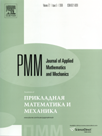 | | Journal of Applied
Mathematics and Mechanics
Russian Academy of Sciences | | Founded
in January 1936
(Translated from 1958)
Issued 6 times a year
ISSN 0021-8928
(print version) |
Archive of Issues
| Total articles in the database: | | 10610 |
| In Russian (ΟΜΜ): | | 9811
|
| In English (J. Appl. Math. Mech.): | | 799 |
|
| << Previous article | Volume 79, Issue 2 / 2015 | Next article >> |
| L.D. Akulenko, S.A. Kumakshev, and S.V. Nesterov, "A numerical-analytical method for investigating parametric oscillations," J. Appl. Math. Mech. 79 (2), 111-121 (2015) |
| Year |
2015 |
Volume |
79 |
Issue |
2 |
Pages |
111-121 |
| DOI |
10.1016/j.jappmathmech.2015.07.001 |
| Title |
A numerical-analytical method for investigating parametric oscillations |
| Author(s) |
L.D. Akulenko (Moscow, Russia)
S.A. Kumakshev (Moscow, Russia, kumak@ipmnet.ru)
S.V. Nesterov (Moscow, Russia) |
| Abstract |
The natural frequencies and modes of the parametric oscillations of mechanical systems are investigated using the Lyapunov-Poincaré theory and the numerical-analytical sagittary function and accelerated convergence methods. An example of a physical pendulum with movable internal masses is studied. The small parametric oscillations of a simple pendulum of variable length are investigated by the numerical-analytical accelerated convergence method for an arbitrary value of the modulation coefficient. Periodic solutions are constructed using a parameter continuation procedure, and the boundaries of the stability regions (in the linear approximation) and of the instability regions (of parametric resonance) are determined. Ince-Strutt diagrams are constructed for arbitrary permissible values of the modulation coefficient of the lowest oscillation modes. Several qualitative effects, which are, in principle, inaccessible when using routine calculations by perturbations methods, are established. |
| Received |
08 April 2014 |
| Link to Fulltext |
|
| << Previous article | Volume 79, Issue 2 / 2015 | Next article >> |
|
 If you find a misprint on a webpage, please help us correct it promptly - just highlight and press Ctrl+Enter If you find a misprint on a webpage, please help us correct it promptly - just highlight and press Ctrl+Enter
|
|

 Russian
Russian  English
English